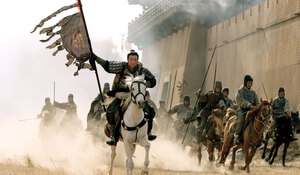‘Red Cliff’ presents a return to form for acclaimed director
When word got out that John Woo was making a historical war film, few knew what to expect. An army of white doves? Close-quarter crossbow shootouts?
Instead, the director of Hong Kong gangster classics such as Hard Boiled delivers an intense retelling of The Battle of Red Cliffs in ancient China. Though not a perfect war film, Red Cliff has enough flair and ambition to let us all know that crossbows are just as cool as submachine guns.

Battle cry · John Woo’s Red Cliff, which is set in 208 CE, has become the highest grossing film in mainland China since it opened in 2008. - Photo courtesy of Magnolia Pictures
It’s the year 208 CE, and Prime Minister Cao Cao of the Han Dynasty has no problems bossing his young emperor around. When his hunt for rebels ends in the slaughter of innocent villagers, some nobles such as Lui Bei decide enough is enough. With the help of his wise adviser, Zhuge Liang, Liu Bei allies with Viceroy Zhou Yu, another southern noble, and together they face off against Cao Cao’s 800,000-man army.
As a veteran of modern action flicks, Woo has his own ideas about Chinese third-century warfare. On a large scale, the massive battles are historical, with chessboard tactics and epic charges.
Up close, however, the action becomes more stylized, with some fighters body-slamming horses and impaling four people with a single spear thrust. These up close moments give the film a definite flair and original feel that manages to sidestep the risk of feeling hokey.
Woo does not create the kabuki-esque fights seen in Hero, and has no qualms dishing out the blood and gore, but the larger than life parts of the film make it feel less like a historical film and more like a war song in the vein of Herodotus’ Histories compared to Frank Miller’s 300. Or for Chinese history fans, more like Romance of the Three Kingdoms than Records of the Three Kingdoms.
This characteristic leads Red Cliff into its chief problem. Epics are great, but they cannot be half-done. Red Cliff still clings to the desire to be a historical film. The switches from realistic to grandiosity are jarring. Ultimately, they make it difficult for the audience to connect with the film.
This connection is what separates Gladiator from Gods and Generals. Without it, the film is left hanging on a museum wall instead of jumping off the screen and dragging you in.
Red Cliff may feel stage-y, but its cast does not. Tony Leung Chiu Wai, who had such a burning intensity in Lust, Caution, is completely believable as the warrior-poet Zhou Yu. He does not need to have his whole family slaughtered to show us war is painful — it’s all there in glances and murmurs.
Zhang Fengyi, who plays Cao Cao, gives an ambitious humanity to what could easily be a one-dimensional villain.
Bringing up the girl’s team is Wei Zhou as Zhou Yu’s sister, Sun Shangxiang, who is fierce without blatant “girl power” rah-rahs. Less interesting is Chiling Lin as Zhou Yu’s swan-necked wife, Xiao Qaoi, whose plot arc seems just a little too maudlin and convenient.
The best performance belongs to Takeshi Kaneshiro as Zhuge Liang. Behind his every smile, you have no idea if he’s planning a bloody ambush or just enjoying the music. If Woo ever delves more into the Three Kingdoms period, Kaneshiro would be fantastic reprising his role and taking the reins as one of the period’s greatest thinkers.
Through no fault of the cast, Red Cliff can be hard to follow, especially for those unfamiliar with Chinese history. Trying to keep track of who’s fighting also distracts from the clanging swords and flying heads. Most characters are introduced through dialogue, but the audience has no time to make sense of the information overload. These exposition bombs come from the cuts made for the American release — the original Chinese cut is almost five hours, and was released as a two-part saga.
Despite its flaws, Red Cliff is still a very entertaining film. It is simply impossible to ignore its ambitious style and Woo has definitely begun to absolve himself of his sins in Paycheck.
It is always interesting to see the results of a talented director branching out into new genres. Woo proves he is just as capable of staging fights on the battlefield as he is in teahouses. Red Cliff may not cement itself as the definitive Three Kingdoms film, but it’s worth its weight in popcorn.

I liked Woo’s other flicks, maybe too violent for American tastes, like “The Killer, A Better Tomorrow, Hard Boiled…”
Those defined the “Hong Kong” shooters.